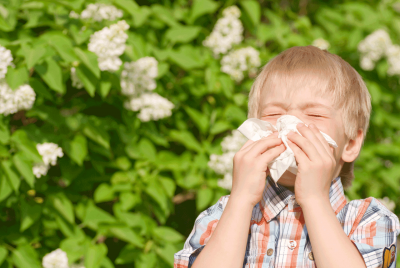What Is an Allergy?
Allergies are an abnormal response of the immune system. People who have allergies have an immune system that reacts to a usually harmless substance in the environment. This substance (pollen, mold, animal dander, etc.) is called an allergen.
Allergies are a very common problem, affecting at least two out of every 10 Americans.
What Happens During an Allergic Reaction?
First, a person is exposed to an allergen by inhaling it, swallowing it, or getting it on or under their skin. After a person is exposed to the allergen, a series of events create the allergic reaction:
- The body starts to produce a specific type of antibody, called IgE, to bind the allergen.
- The antibodies attach to a form of blood cell called a mast cell. Mast cells can be found in the airways, in the intestines, and elsewhere. The presence of mast cells in the airways and GI tract makes these areas more susceptible to allergen exposure.
- The allergens bind to the IgE, which is attached to the mast cell. This causes the mast cells to release a variety of chemicals into the blood. Histamine, the main chemical, causes most of the symptoms of an allergic reaction.
What Are the Symptoms of an Allergic Reaction?
Common symptoms of an allergic reaction to inhaled or skin allergens include:
- Itchy, watery eyes
- Sneezing
- Itchy, runny nose
- Rashes
- Feeling tired or ill
- Hives (a rash with raised red patches)
Other exposures can cause different allergic reactions:
- Food allergies. An allergic reaction to food allergens can also cause stomach cramps, vomiting, or diarrhea.
- Insect stings. The allergic reaction to a sting from a bee or other insect causes local swelling, redness, and pain.
The severity of an allergic reaction’s symptoms can vary widely:
- Mild symptoms may be almost unnoticeable, just making you feel a little “off.”
- Moderate symptoms can make you feel ill, as if you’ve got a cold or even the flu.
- Severe allergic reactions are extremely uncomfortable, even incapacitating.
Most symptoms of an allergic reaction go away shortly after the exposure stops.
The most severe allergic reaction is called anaphylaxis. In anaphylaxis, allergens cause a whole-body allergic reaction that can include:
- Hives and itching all over (not just in the exposed area)
- Wheezing or shortness of breath
- Hoarseness or tightness in the throat
- Tingling in the hands, feet, lips, or scalp
Anaphylaxis is life-threatening and requires immediate medical attention. Symptoms can progress rapidly, so head for the emergency room if there’s any suspicion of anaphylaxis.
Does Everyone Have Allergies?
No, not everyone has allergies. People inherit a tendency to be allergic, although not to any specific allergen. When one parent is allergic, their child has a 50% chance of having allergies. That risk jumps to 75% if both parents have allergies.

